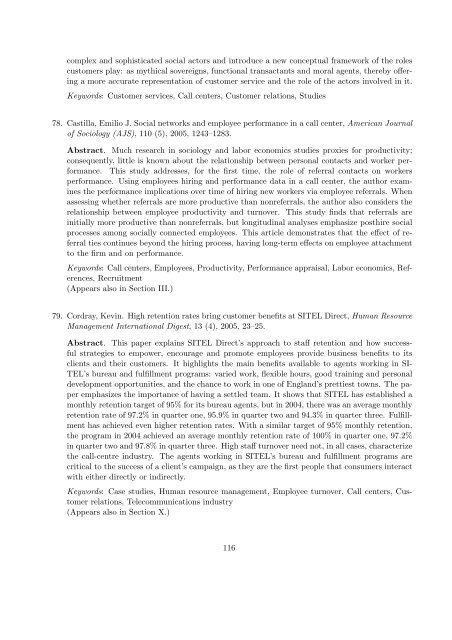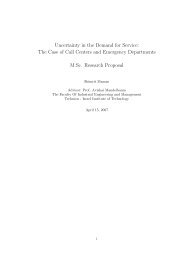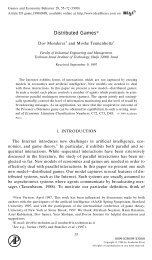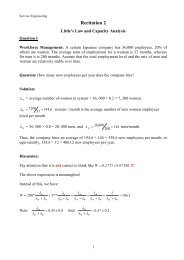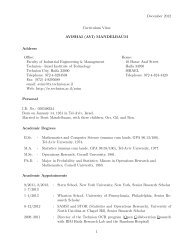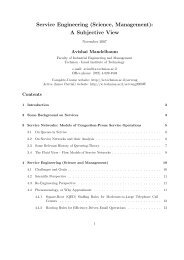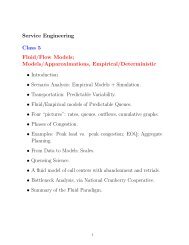CALL CENTERS (CENTRES) - Faculty of Industrial Engineering and ...
CALL CENTERS (CENTRES) - Faculty of Industrial Engineering and ...
CALL CENTERS (CENTRES) - Faculty of Industrial Engineering and ...
You also want an ePaper? Increase the reach of your titles
YUMPU automatically turns print PDFs into web optimized ePapers that Google loves.
complex <strong>and</strong> sophisticated social actors <strong>and</strong> introduce a new conceptual framework <strong>of</strong> the roles<br />
customers play: as mythical sovereigns, functional transactants <strong>and</strong> moral agents, thereby <strong>of</strong>fering<br />
a more accurate representation <strong>of</strong> customer service <strong>and</strong> the role <strong>of</strong> the actors involved in it.<br />
Keywords: Customer services, Call centers, Customer relations, Studies<br />
78. Castilla, Emilio J. Social networks <strong>and</strong> employee performance in a call center, American Journal<br />
<strong>of</strong> Sociology (AJS), 110 (5), 2005, 1243–1283.<br />
Abstract. Much research in sociology <strong>and</strong> labor economics studies proxies for productivity;<br />
consequently, little is known about the relationship between personal contacts <strong>and</strong> worker performance.<br />
This study addresses, for the first time, the role <strong>of</strong> referral contacts on workers<br />
performance. Using employees hiring <strong>and</strong> performance data in a call center, the author examines<br />
the performance implications over time <strong>of</strong> hiring new workers via employee referrals. When<br />
assessing whether referrals are more productive than nonreferrals, the author also considers the<br />
relationship between employee productivity <strong>and</strong> turnover. This study finds that referrals are<br />
initially more productive than nonreferrals, but longitudinal analyses emphasize posthire social<br />
processes among socially connected employees. This article demonstrates that the effect <strong>of</strong> referral<br />
ties continues beyond the hiring process, having long-term effects on employee attachment<br />
to the firm <strong>and</strong> on performance.<br />
Keywords: Call centers, Employees, Productivity, Performance appraisal, Labor economics, References,<br />
Recruitment<br />
(Appears also in Section III.)<br />
79. Cordray, Kevin. High retention rates bring customer benefits at SITEL Direct, Human Resource<br />
Management International Digest, 13 (4), 2005, 23–25.<br />
Abstract. This paper explains SITEL Direct’s approach to staff retention <strong>and</strong> how successful<br />
strategies to empower, encourage <strong>and</strong> promote employees provide business benefits to its<br />
clients <strong>and</strong> their customers. It highlights the main benefits available to agents working in SI-<br />
TEL’s bureau <strong>and</strong> fulfillment programs: varied work, flexible hours, good training <strong>and</strong> personal<br />
development opportunities, <strong>and</strong> the chance to work in one <strong>of</strong> Engl<strong>and</strong>’s prettiest towns. The paper<br />
emphasizes the importance <strong>of</strong> having a settled team. It shows that SITEL has established a<br />
monthly retention target <strong>of</strong> 95% for its bureau agents, but in 2004, there was an average monthly<br />
retention rate <strong>of</strong> 97.2% in quarter one, 95.9% in quarter two <strong>and</strong> 94.3% in quarter three. Fulfillment<br />
has achieved even higher retention rates. With a similar target <strong>of</strong> 95% monthly retention,<br />
the program in 2004 achieved an average monthly retention rate <strong>of</strong> 100% in quarter one, 97.2%<br />
in quarter two <strong>and</strong> 97.8% in quarter three. High staff turnover need not, in all cases, characterize<br />
the call-centre industry. The agents working in SITEL’s bureau <strong>and</strong> fulfillment programs are<br />
critical to the success <strong>of</strong> a client’s campaign, as they are the first people that consumers interact<br />
with either directly or indirectly.<br />
Keywords: Case studies, Human resource management, Employee turnover, Call centers, Customer<br />
relations, Telecommunications industry<br />
(Appears also in Section X.)<br />
116


